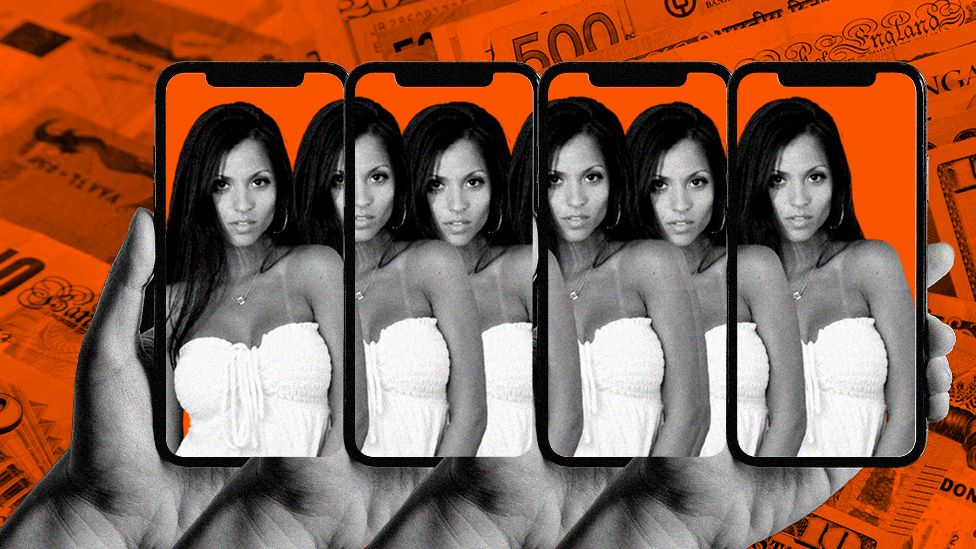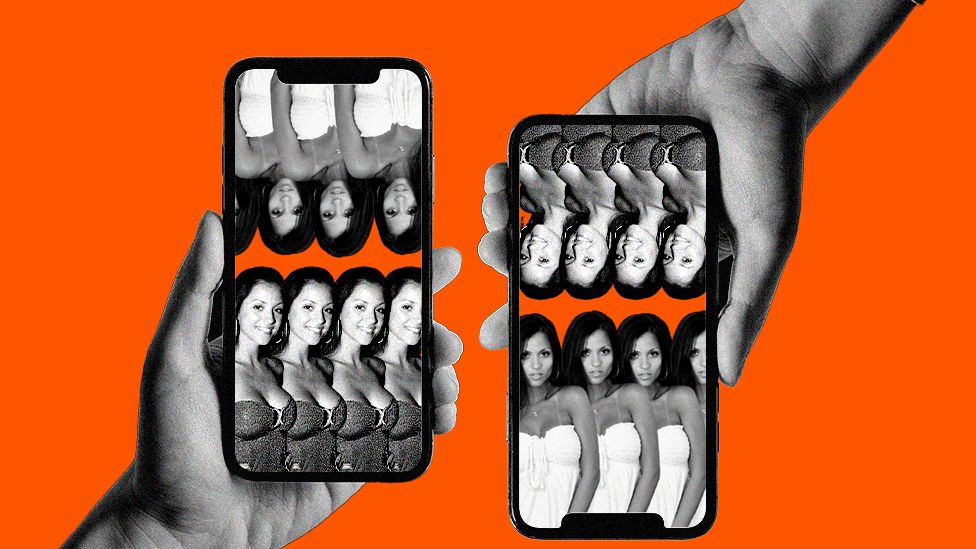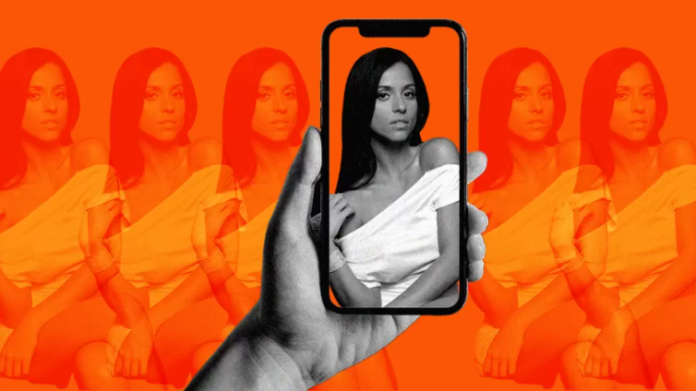For over a decade, stolen images of a former adult star have been used to scam victims out of thousands of dollars.
How does it feel to be the unwitting face of so many romance scams?
This article contains spoilers.
Almost every day, Vanessa gets messages from men who believe they are in a relationship with her – some even think she’s their wife.
They are angry, confused and some want their money back – which they say they sent her to pay for daily expenses, hospital bills, or to help relatives.
But it is all a lie. Vanessa doesn’t know these men. Instead, her pictures and videos – lifted from her past life in adult entertainment – have been used as the bait in online romance scams dating back to the mid-2000s. Victims had money extorted through fake online profiles using Vanessa’s name or likeness, in a type of romance scam called catfishing.
The flood of messages containing tales of lost money and ruined lives have taken their toll.
“I started becoming depressed, and blaming myself – maybe if my pictures weren’t out there, these men wouldn’t be getting scammed,” Vanessa says – we’re not using her surname to protect her full identity.
For about eight years, Vanessa worked as a “camgirl” – streaming explicit material live on the internet via webcam. Because she was a bit shy when she started out, she decided to create an alter ego called Janessa Brazil. “It’s not really me, it’s Janessa, so I won’t be ashamed,” she thought.
She picked the surname Brazil not only because it’s where she was born, but also because it’s one of the most popular search terms on the internet. It was a savvy decision. “I hate that name,” she says now. “But it helped me get popular quickly.”
For a while, things were great. Vanessa enjoyed the relationship with her fans, who would pay up to $20 (£17) per minute to watch and interact with her. “I want to please them. I want to have fun with them. And they get hooked,” she says.
At the peak of her career, she says she was earning about a million US dollars a year. Janessa had her own website, a successful brand and a vibrant online presence. But in 2016 her online profile went dark.
It took us nine months to find her for the podcast Love, Janessa. When we finally spoke to Vanessa in her modest apartment on the US east coast, she told us that part of the reason she quit making online content was to try to stop the scammers. “I no longer want to give them the power to use anything of mine ever again,” she says.
Vanessa first became aware scammers were pretending to be her when a man posted in the chat during a live show, adamant that he was her husband and she had promised him that she’d stop camming. She thought it was a prank, but asked him to email her.
More victims came forward with similar stories, posting comments during her shows, and asking her to prove her identity. Scammers also popped up with weird requests for her – like putting on a red hat – images they then used to trick victims.
The constant comments, emails and tense atmosphere began to affect her business. “It was a nightmare,” says Vanessa. “But I felt bad for these guys. What am I supposed to do?”
At first she tried to respond to every email, which took hours each day. She says her then husband, who was also her manager, also started monitoring the messages. He told scam victims that he and Vanessa were not liable for the money the men had lost.
“If I got all the money that these guys sent all these scammers, I would be a billionaire today, not sitting here in my little apartment,” she says.

Vanessa thinks it’s in many men’s nature to want to take care of women, which explains why they send money to someone they haven’t met.
“Even if they don’t have the money, they’re still willing to give it, just to feel loved,” she says.
Roberto Marini, an Italian in his early 30s, was hooked by a fake Janessa. It began with a message on Facebook from a striking young woman calling herself Hannah, who complimented him on his start-up business – a sustainable farm on the island of Sardinia.
After three months of exchanging pictures and loving messages, she began to ask for money. It was for little things at first, like a broken phone, but soon she needed more. She told him she had a tough life – when she wasn’t looking after sick relatives she had to make a living in adult entertainment.
Roberto wanted to save her, feeling a “father-ish energy” towards her. But he was frustrated that they could never seem to speak in person – every time they arranged a call, her phone would break or something else would come up.
Then he discovered thousands of pictures and videos of Hannah online – except they were of adult entertainment star Janessa Brazil – and many were more explicit than the ones Hannah had ever sent him.
Their love felt real, so he wondered whether she did not want to reveal her true identity in case it complicated their relationship.
Confused, Roberto joined one of Janessa Brazil’s live online shows. “Is it really you?” he typed into the chat. He didn’t get the answers he wanted, and he was paying by the minute so didn’t stay long.
In his quest to find out the truth, Roberto also emailed her, along with many other people he thought might be the real Janessa. During our interview with her, Vanessa looked back at her inbox and found a message from him amongst thousands of emails.
“Hi. I have the need to talk with the real Janessa Brazil,” he had written in 2016. She had replied an hour later, “I am the real Janessa Brazil.”
He asked her a few more questions trying to find out if they had spoken before. This email exchange was the first and only contact they’d ever had.
But that was not the end. Roberto remained ensnared by scammers. He says he sent them a total of $250,000 (£207,500) over four years, draining his savings and borrowing money from friends and family, as well as taking out loans.
We found Roberto through his online posts warning others that fake accounts were conning people using Janessa’s stolen images. But, even after everything that had happened to him, part of him still believed he had a deep connection with the real Janessa.
That is the sign of a successful scam, says Dr Aunshul Rege, a criminal justice expert from Philadelphia who has studied online romance scams.
She says messages are often sent by criminal networks working in teams to groom victims, sharing images and information. She has even found an example of the manuals they use – practical how-to guides that also list excuses to avoid a phone call which might expose them.
The scams follow a pattern – love bombing, threats of a break-up and then requests for financial help, supposedly to allow the couple to finally be together. The tactics are so formulaic as to be chillingly familiar to anyone who has been at the receiving end, but they work.
“As human beings we are wired to help each other out. That’s just how we’re built,” Dr Rege says.
Vanessa says she hates these cruel tactics. “They show love and then take it away. The guys get desperate and they’re willing to do anything to get it back,” she says.
Dr Rege thinks it’s likely Roberto’s scam was run by an organised group. She says there are huge networks that operate around the world, with substantial numbers originating from Turkey, China, UAE, UK, Nigeria and Ghana.
One of the places Roberto was asked to send money was Ghana, home to a group of online scammers called the Sakawa Boys. We tracked some of them down in Accra. “Ofa”, a softly-spoken young man, told us that impersonating people online is time-consuming and involves a lot of administration – if only to keep track of the lies. He admitted the work made him “feel bad”, but that he had made over $50,000 (£41,500).

When shown images of Janessa, Ofa said he had not used them himself, but understood why they would be a favourite among scammers. He also said that for a scam to work, he would need a variety of pictures showing the women in everyday situations – like cooking or at the gym.
Vanessa thinks her pictures have been used partly because she shared so many candid moments from her daily life. “I put myself out there completely, so they had a lot to work with,” she says.
But she draws a clear line between her professional alter ego and her real self. “Vanessa has panic attacks. Janessa doesn’t,” she says.
Eventually, the unstoppable tide of scam victims grew into “a monster” that traumatised Vanessa.
Having to perform every day on camera began to affect her mental health and her marriage. Exhausted, Vanessa told us she started drinking before her shows. She says she hates watching videos from that time because she can see her own unhappiness.
By 2016, she says she couldn’t take it any longer and decided to quit. She says she packed her car, left her home and husband, and drove off to a new life. Now she is training as a therapist, and writing a memoir – taking back control of her own story.
Vanessa has never gone to the authorities to report scammers using her image. She doesn’t think they would take her complaints seriously. “They’re going to look at me like, ‘You’re a porn star’ and laugh at my face,” she says.
Over the years since, she has become more resilient. She knows scammers may never stop pretending to be her, but she understands why some victims get caught in the trap.
“When it comes to love, we can be so dumb,” she says. “I know, I’ve been there. It’s like, ‘Damn! I’m smarter than this!’ So it happens to all of us.”
Reporting by Hannah Ajala, Laura Regehr, Katrina Onstad and Simona Rata
Art work by Jenny Law
Listen to Love, Janessa here

